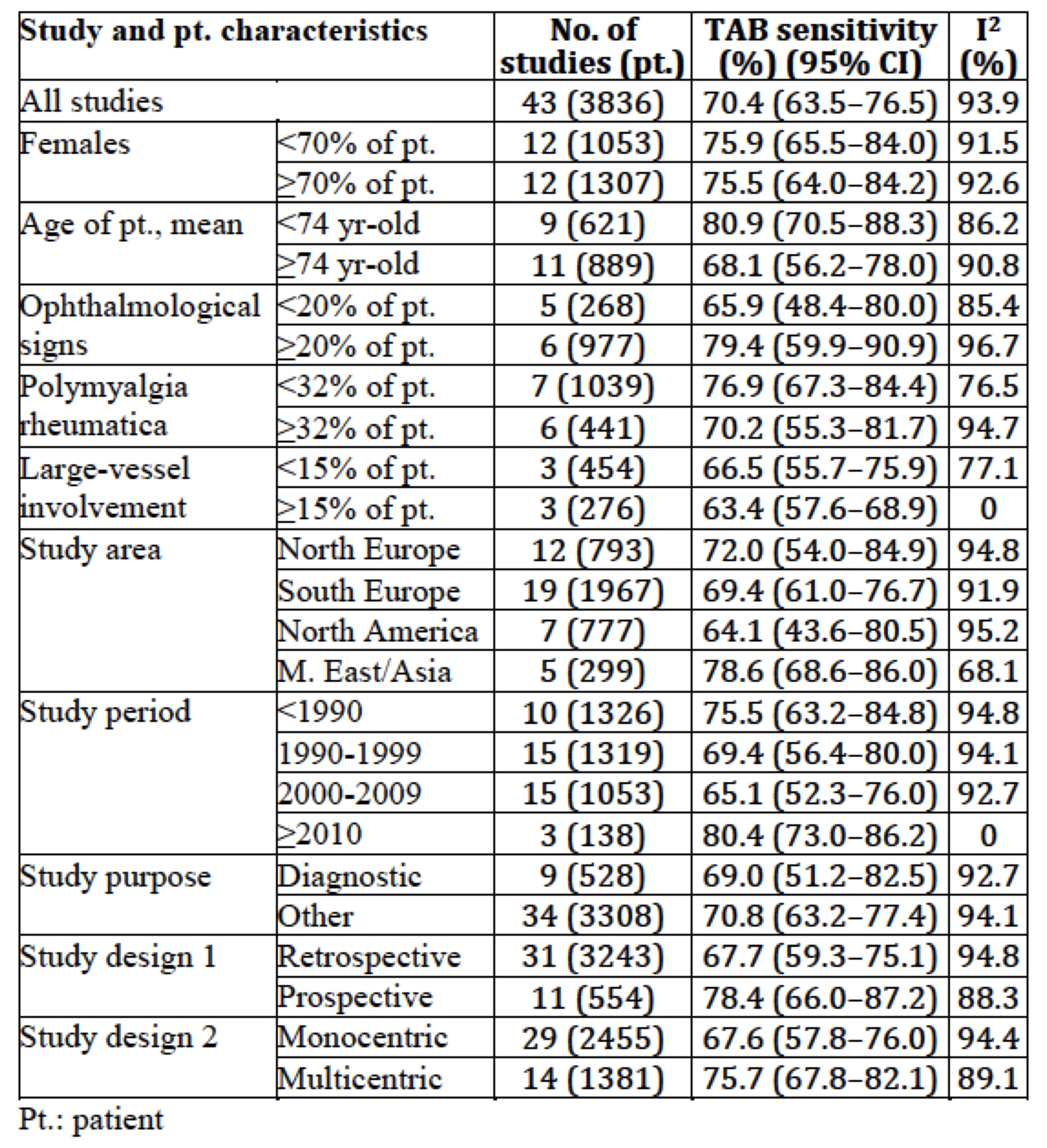Session Information
Session Type: ACR Poster Session A
Session Time: 9:00AM-11:00AM
Background/Purpose: Temporal artery biopsy (TAB) is a reference test for establishing a diagnosis of giant cell arteritis (GCA). A subset of patients with a clinical diagnosis of GCA does not show the characteristic histopathological signs, possibly because of technical artifacts or true phenotypic differences. The proportion of TAB-positive GCA cases varies across studies, and the lack of consensus on the sensitivity of TAB hampers comparisons with the performance of non-invasive diagnostic tests. In addition, the patient or study characteristics potentially influencing the sensitivity of TAB are not known. We performed a systematic literature review and meta-analysis to estimate the sensitivity of a positive TAB in GCA and identify factors involved in its variations.
Methods: We searched MEDLINE, EMBASE and CENTRAL databases for articles reporting TAB in GCA that were published from 1990 to 2016, with no language restriction. Eligibility criteria included studies with at least 30 GCA cases fulfilling the 1990 ACR criteria. From eligible publications, two independent researchers extracted the main demographic, clinical and study design characteristics and the number of TAB-positive cases among all cases with interpretable results for TAB. By meta-analysis, we computed the pooled proportion of TAB-positive GCA cases by a random-effects model with logit transformation. The extent of variability between studies was assessed by the I2 statistic. Subgroup and meta-regression analyses were used to examine the effect of covariates (e.g., clinical, geographic, temporal and study descriptors) on TAB positivity.
Results: Among 3642 screened publications, 108 met the eligibility criteria. After publications with overlapping patient populations were removed, 43 studies (3836 GCA patients in total) were used for analysis. The pooled proportions of TAB positivity in GCA for all studies combined and within subgroups are shown in the Table. The proportion of TAB-positive GCA did not notably differ by patient or study characteristics on subgroup or meta-regression analysis.
Conclusion: The estimated proportion of 70% TAB-positive GCA provides a reference for the sensitivity of TAB in GCA. The unexplained high between-study heterogeneity could result from differences in TAB sampling and processing methods or histopathologic criteria applied or varying propensities to diagnose TAB-negative GCA.
To cite this abstract in AMA style:
Rubenstein E, Maldini C, Gonzalez-Chiappe S, Chevret S, Mahr A. Sensitivity of Temporal Artery Biopsy in Giant Cell Arteritis: Systematic Literature Review and Meta-Analysis of Clinical Data [abstract]. Arthritis Rheumatol. 2017; 69 (suppl 10). https://acrabstracts.org/abstract/sensitivity-of-temporal-artery-biopsy-in-giant-cell-arteritis-systematic-literature-review-and-meta-analysis-of-clinical-data/. Accessed .« Back to 2017 ACR/ARHP Annual Meeting
ACR Meeting Abstracts - https://acrabstracts.org/abstract/sensitivity-of-temporal-artery-biopsy-in-giant-cell-arteritis-systematic-literature-review-and-meta-analysis-of-clinical-data/

